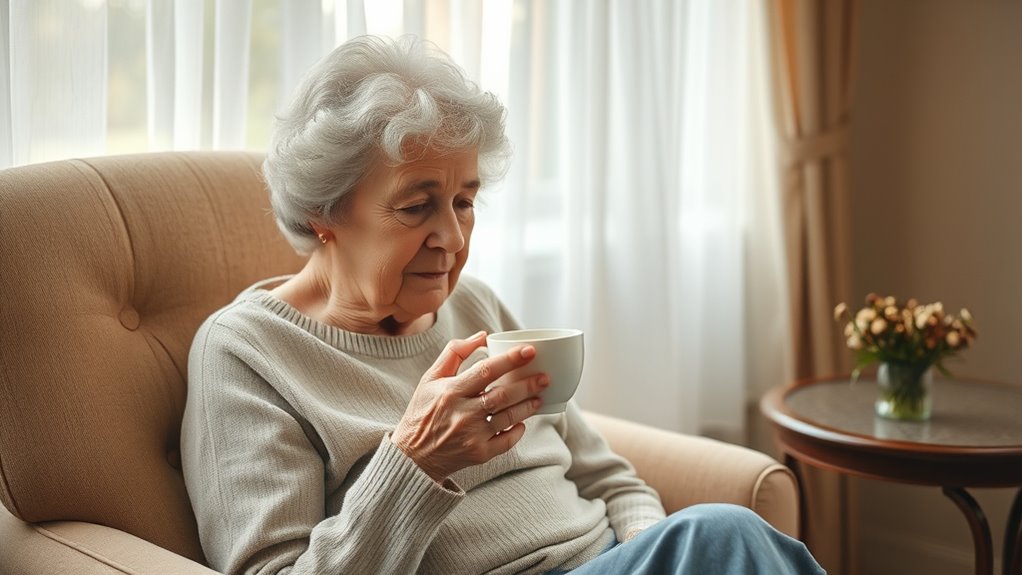Taking care of yourself while caring for a dying loved one is essential for maintaining your emotional resilience and physical health. Acknowledge your feelings, seek support, and find small moments to process emotions—whether through journaling, talking, or counseling. Prioritize simple self-care routines like staying hydrated, eating nutritious foods, and taking short breaks. Setting boundaries and practicing mindfulness can help sustain your energy. To learn more about balancing caregiving and self-care, keep exploring ways to nurture yourself during this difficult time.
Key Takeaways
- Prioritize self-care routines like adequate sleep, nutrition, and hydration to maintain physical health and energy.
- Acknowledge and process your emotions through journaling, talking, or counseling to build emotional resilience.
- Set boundaries to protect personal time and prevent burnout, allowing for regular breaks and relaxation.
- Seek support from trusted friends, family, or professionals to share feelings and reduce emotional overload.
- Incorporate mindfulness practices such as deep breathing or gentle exercises to reduce stress and foster calmness.

Caring for a dying loved one is an emotionally demanding experience that can often leave you feeling overwhelmed and exhausted. It’s natural to put their needs first, but neglecting yourself can quickly lead to burnout. To navigate this challenging time, building emotional resilience is essential. This resilience helps you manage the intense feelings that come with caregiving, such as grief, frustration, and helplessness. You can strengthen it by acknowledging your emotions instead of suppressing them. Find small moments to process your feelings—whether through journaling, talking with a trusted friend, or seeking support from a counselor. Remember, it’s okay to feel vulnerable. Accepting your emotions allows you to conserve mental energy and maintain a sense of stability amid chaos.
Alongside emotional resilience, prioritizing physical self-care is equally crucial. Caring for someone who is terminally ill often demands long hours, disrupted sleep, and physical exertion. You might feel guilty about taking time for yourself, but neglecting your body only diminishes your ability to provide support. Establish simple routines that promote your well-being, like staying hydrated, eating nutritious foods, and taking short breaks to stretch or walk outside. Even a few mindful minutes of deep breathing can help lower stress levels. Sleep, although elusive at times, should remain a priority; fatigue makes it harder to stay emotionally balanced and respond compassionately. Recognize your physical limits and ask for help when needed—whether from other family members, friends, or professional caregivers. You don’t have to do everything alone. Incorporating mindfulness techniques such as yoga breathing exercises can help manage stress and foster a sense of calm amid chaos.
Incorporating self-care into your daily routine isn’t a sign of weakness but a necessary act of self-preservation. Set boundaries to protect your energy and avoid guilt over taking time for yourself. Remember that caring for your emotional resilience and physical health isn’t selfish—it’s essential for maintaining the strength needed to support your loved one. When you’re well-rested, emotionally grounded, and physically cared for, you’re better equipped to handle whatever each day brings. This, in turn, creates a more sustainable caregiving experience, giving you the resilience needed to face the emotional rollercoaster with grace. Prioritize yourself alongside your loved one; your well-being is fundamental to providing compassionate, consistent care during this difficult journey.
Frequently Asked Questions
How Can I Find Support Groups for Caregivers?
You can find support groups for caregivers by searching online directories like the National Hospice and Palliative Care Organization or local community centers. Many groups focus on building emotional resilience and peer connection, offering a safe space to share experiences. Consider asking healthcare providers for recommendations or visiting social media platforms and forums dedicated to caregiver support. These resources help you connect, share, and strengthen your emotional well-being during this challenging time.
What Financial Assistance Options Are Available for Caregivers?
You might find financial assistance options through government programs like Medicaid or Medicare, which help reduce financial hardship. Additionally, explore legal resources such as Medicaid planning or veteran benefits if applicable. Nonprofits and local charities often provide grants or support services to ease expenses. Remember, reaching out early can access resources that lessen your financial burden, making caregiving more manageable during this challenging time.
How Do I Handle Feelings of Guilt or Resentment?
You handle feelings of guilt or resentment by setting emotional boundaries and practicing self-compassion. Remind yourself that you’re doing your best, and it’s okay to feel overwhelmed. Allow yourself to acknowledge these emotions without judgment, and take time for self-care. Talking with a trusted friend or counselor can help process feelings. Remember, caring for yourself isn’t selfish; it’s essential to maintain your well-being while supporting your loved one.
What Are Signs of Caregiver Burnout I Should Watch For?
You might notice signs of caregiver burnout through emotional exhaustion, like feeling overwhelmed or hopeless, and physical fatigue, such as constant tiredness or sleep trouble. You could also experience irritability, difficulty concentrating, or losing interest in activities you usually enjoy. If you find yourself withdrawing from others or neglecting your own needs, it’s a clear sign to seek support and take a break to recharge.
How Can I Maintain My Own Mental Health During This Time?
To maintain your mental health, focus on building emotional resilience by staying connected with supportive friends or a counselor. Prioritize self-care routines like regular exercise, proper sleep, and mindfulness practices. Allow yourself to feel and express emotions without guilt, and set boundaries to prevent burnout. Remember, taking time for yourself isn’t selfish; it helps you stay strong and present for your loved one during this challenging time.
Conclusion
Remember, caring for yourself isn’t selfish — it’s essential. Research shows that caregivers who prioritize their own well-being experience less burnout and provide better support. Think of self-care as the oxygen mask on a plane: you need to put it on first before helping others. By nurturing your own health, you strengthen your ability to be present and compassionate for your loved one during their final days. Take care of yourself, and you’ll be better equipped for the journey ahead.









